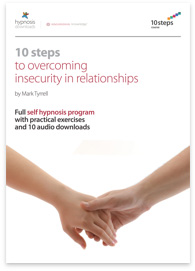Fear of Abandonment
5 specific tasks to help you overcome abandonment issues

"I used to have this recurring nightmare. I'd be standing on a rain swept street corner - utterly alone - totally abandoned, lost...I always wondered why I had that dream. Then one day, it happened for real. My ma walked out on all of us!"
Sam, a client from years back, told his story and I was quickly reminded of my own maternal grandfather's early life. When he was four, his mother had walked out on him, his three brothers, and father, saying she was "off to get some milk" (aka "I'm off to be with my lover!").
For years after, my grandfather always somehow hoped the appearance of fresh milk in the house would signify the imminent return of his mother – which, of course, it never did. I never knew him, but by all accounts he showed signs of emotional insecurity throughout his life.
What is fear of abandonment?
First off, just because someone has been abandoned at some point, it doesn't inevitably mean they'll come to have a morbid fear of abandonment later in life. I've known many people suffer awful and sudden abandonment and years of loneliness and still not have any real issues trusting or feeling secure in relationships. So there is no inevitability to it - we all respond differently to life.
Then again, some people who were never actually abandoned develop the fear; perhaps because they love so passionately, have never learnt emotional independence, or misuse their imagination to scare themselves. So if you have a fear of abandonment, it may stem from experiences you've actually had or it might simply be a fear of experiences you'd hate to have.
People who have an undue fear of abandonment are more likely to:
- Be less likely to trust others.
- Be cynical - "people always let you down in the end".
- Feel anxious and insecure, looking for signs that abandonment is about to happen.
- Behave in clingy or demanding ways which in itself can damage the very relationship they fear losing.
Here are some tips to help you overcome fear of abandonment:
1) As a general rule: Stop over-generalizing
I recall treating a man who'd been traumatized after being mugged two years before. All three of his muggers had heavy beards. Now whenever he saw any man with a beard, he became anxious. Fear does that to us. It makes us over-generalize a possible threat.
- "I was left by my husband! - No men can be trusted!"
- "I was cheated on by my wife! - I can't trust any women."
- "Someone I love left me! - Never allow yourself to love because you'll always be hurt!"
This over-generalizing prevents people trusting and truly committing to all kinds of different relationships. Because people and circumstances are different and until we can feel the difference, we'll condemn ourselves to needlessly unhappy lives.
So:
- Realize when you are 'tarring everyone/every situation with the same brush'.
- Really start to focus on the differences between people and circumstances.
When we are frightened, we avoid. This is natural, but if we are frightened of what we need then this avoidance in itself makes us unhappy...
2) Name your fear; unmask the beast
'Fear of abandonment' is a bit vague, isn't it? Sam (see start of article) had actually been diagnosed by another therapist as having 'abandonment issues', but again this is too vague. And diagnosis is not the same as treatment.
"What exactly are you afraid of?" I asked.
"Well, I feel anxious whenever I'm in a relationship!"
I continued to ask what he feared might happen and eventually he said:
"I'm terrified she'll leave me! And I'll feel all alone in the world, as I did when Ma abandoned us." Ah, so now we were getting more specific.
"How old were you then?" I asked him.
"Seven!"
"And now?"
"Thirty-eight!"
"And you're frightened that somehow, if the relationship did end, you'd feel as helpless and as lost as a seven-year-old?"
"I guess that's right!"
I did some hypnotic work with him and we spent the remainder of that session focussing on how he was different now thirty years later, how he'd cope if she did leave, and how this woman was a very different character from his mother.
Whittle it down. What specifically are you afraid of, beyond indistinct labels such as 'fear of abandonment'?
3) Sort out the past
Being a solution-focussed therapist, I'm not the sort of chap to dwell unduly on the past, digging through old hurts, trying to 'get to the root of it all' through 'psychological archaeology'. So often, that doesn't help beyond giving someone a sense of why they feel bad; it doesn't help them see how they can actually move on.
Of course, sometimes the past does keep tripping up the present, so we need to do something. But it's not enough just to 'explore' what happened. We need to change the way it feels so it can stop bothering us.
There is a great hypnotic exercise which helped Sam immensely. I had him focus on all his adult traits, abilities, learnings, and perspective and think of a trusted adult friend.
Next, with a sense of the presence of that friend and his own adult attributes and perspectives, I had him hypnotically go comfort his seven-year-old self. He was to put his arms around him (his much younger self) and tell him not to worry because everything was going to be okay in the future.
He went back to a time when he had felt particularly bad on first learning his mother wouldn't be coming back. Afterwards, he reported feeling much calmer and "at peace" for the first time he could remember.
4) In the words of the song: "I will survive!" And so will you.
Prepare for the worst and then... forget about it.
Often when people are abandoned (whether because someone leaves or even dies), they feel utterly hopeless and helpless. But you are never helpless.
Write down a list of all (and I do mean all) your personal strengths, attributes, and character traits that would get you through if you were to be abandoned. Next write down a list of people and outside resources that would help you 'survive'. Even take some time to imagine how you'd cope, then thrive.
When you stop thinking of yourself as hopeless and helpless, you stop feeling so vulnerable and you start enjoying your relationships more. Ah! That reminds me, the last tip...
5) Enjoy your relationships
All we ever really have is right here, right now. Your only reality at this present exact moment is reading these words (I suddenly feel very honoured). Everything else - the people you know, the past, hope and fears for the future, all that stuff - only exists in your mind because you are not with those people, or in the past or future.
Nothing lasts forever, so enjoy where you're at and whom you're with. And remember that when you choose to trust someone you are, in effect, presenting them with a gift. How they treat that gift is a reflection of them, not you.
Stop thinking in terms of 'abandonment', because it's more realistic to think in terms of 'splitting up' or 'relationships breaking down' or 'things not working out'. The idea of 'abandonment' implies you are more powerless than you really are.
Just like a fully grown lion who doesn't know he's grown, still thinking he is small and powerless, we fear we'll be as helpless as we felt way back when, in fact, we all change and you can use those changes.
I only wish I'd known my grandfather.
10 Steps to Overcome Insecurity in Relationships course
Despite how much you love your partner, are you worried you're driving them away?...







